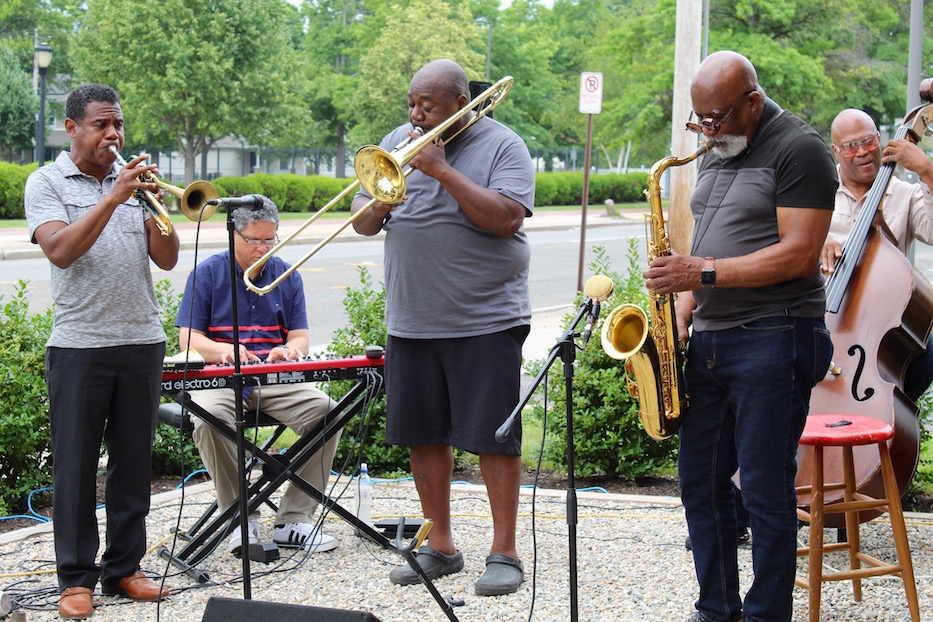
ConnCAT | Culture & Community | Jazz | Music | Science Park | Arts & Culture | COVID-19
Yvonne Monk Adams’ voice sailed over the patio at Orchid Café, smooth as butter until it was suddenly a growl. Behind her, William Fluker listened carefully for his opening, then slid in front of the mic and let his flugelhorn do the talking. It wailed and snarled as plates of thickly breaded chicken, fat-speckled home fries and stacks of pancakes topped with peach syrup came out from the kitchen.
When Adams came back onto the mic—Late nights! Street fights! Police lights! In my rearview mir-ror! I don’t know if my man will make it home tonight—members of the audience clapped and cheered.
Adams was one of several guests to grace the mic Sunday at the Connecticut Center for Arts & Technology (ConnCAT), where jazz brunches have returned to the Orchid Café patio for the second year in a row. Dubbed “July of Jazz,” the weekly series opened with a three-hour set from the William Fluker All-Star Jazz Band and sax player Hank Bolden, who played at the storied Monterey Club on Dixwell Avenue for years.
The afternoon also featured a conversation between Bolden and musician Paul Bryant Hudson, who stayed to perform. Dozens attended, tucking into plates prepared by students in ConnCAT’s culinary arts program.
“It has been some time since we gathered,” said ConnCAT President and CEO Genevive Walker. “This year—it has been tough. Let’s reinvigorate this space in our lives.”
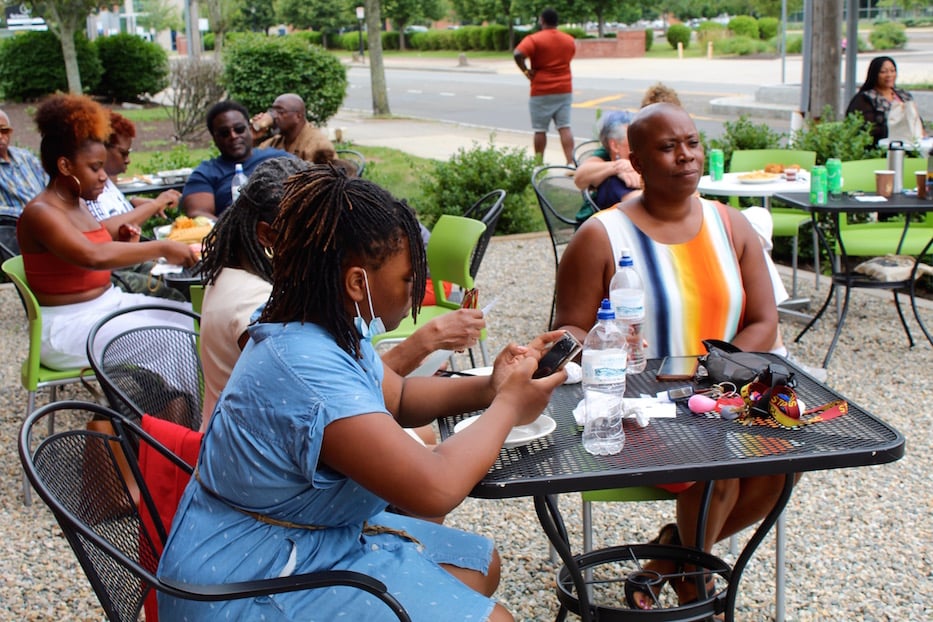
Walker: "Let's reinvigorate this space."
From the moment it began, Sunday’s performance celebrated New Haven’s deep roots in jazz and history of intergenerational music making. As plates of crab cakes benedict, buttermilk fried chicken, strawberry cheesecake stuffed pancakes and bourbon-cured bacon clattered out from the kitchen, members of New Haven’s jazz elite took their seats beside those who are still learning the form, including students in ConnCAT’s youth programs.
James Johnson—more widely known and beloved as Dinkie, the former owner of the eponymously named jazz club—sat just feet from young drummer Christian Edwards. Yvonne Monk Adams slid into a table at the back, ready for a different kind of Sunday worship. Before singing later in the program, rising Common Ground High School junior Jeremiah Godley hung on to her every word.
Inside the warm kitchen, Chef Jenna Martin and ConnCAT's students conducted a culinary ballet that earned high praise from attendees. She later said that she wanted to “give the specials their own flare,” riffing on the standard Monterey Chicken menu just as the instruments played off of each other outside.
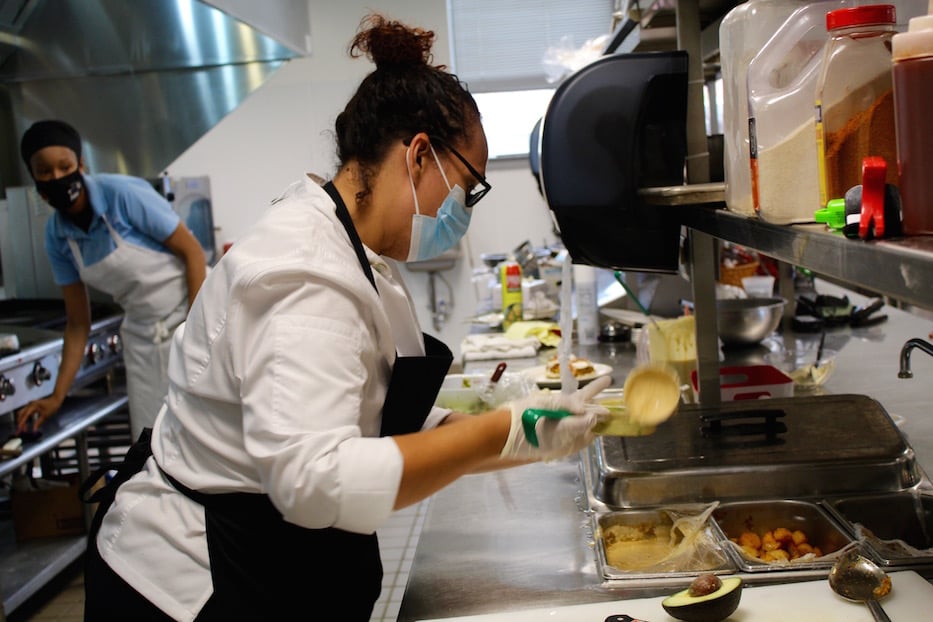
Martin at work in the kitchen.
When Monterey Chicken opened earlier this year, every item on the menu paid homage to jazz. Martin wanted to create “an upscale brunch,” with tender crab cakes nestled onto English muffins and topped with poached eggs and a smooth avocado cream sauce, pancakes with strawberries, cream cheese and candied lemon, and all manners of fried chicken with hot, sweet, and cool dipping sauces.
“I would say that it tastes like home,” Hudson said before the jazz program, biting into a chicken tender with breading toasted to a crisp, golden brown.
Back on the patio, brunch was in full swing. On keys, pianist Roger Knupp eased into a rhythm, sending a wave of round notes bouncing out onto the gravel and brick. Behind him, Barry Reis balanced a drumstick and mallet, making the cymbal and snare drum talk to each other in time with Morris Trent’s double bass. The percussion chased its tail and sang through the space, so fast it seemed like Reis could not possibly be playing with two hands alone.
Bolden waited patiently for an entrance, nodding to the crosstalk of drums and percussion. When it came, keys leading the way, he started gradually, letting the sax slip slowly into the piece before it took over. It spiralled, trilled, and then wove up to meet the flugelhorn. The two started a call and response that had attendees cheering, and then holding their breath.
Between notes, he held his sax and watched players carefully, tracing their every movement. He later said that seven decades into his career—he started playing seriously at 14, and is now 84—he still thinks of himself as a serious student of music, with something new to learn every day.
At their seats, Elizabeth Nearing and Hudson leaned into the music, equal parts spellbound and unable to contain a giddy, contagious excitement. Minutes earlier, the two had been mulling over the poetry that lives in Slim Gaillard’s "Potato Chips.” Now, Hudson picked up the sax melody and hummed along quietly as Bolden played.
“I’m just thinking of what the world would be like if people listened to each other the way they are listening to each other right now,” Nearing said.
Around them, people continued to trickle in, some with their instrument cases and drum sticks ready to go. Walker dipped into Orchid’s cool cafeteria and emerged with more chairs. Friends pulled up seats and hugged for the first time in over a year.
Adams, who recorded her own adaptation of George Gershwin’s “Summertime” in April, put in her brunch order and approached the mic, the skirt to her tunic flapping in the breeze. Her spin on the standard was inspired after watching a wave of state-sanctioned violence grip the country last summer. She whispered instructions to the band and then turned back to the audience.
“While we were shut up on the inside, there was a lot of things going on on the outside,” she said. “And for me, the George Floyd moment was why I flipped this song. Pay attention to the words, so you can catch the flip.”
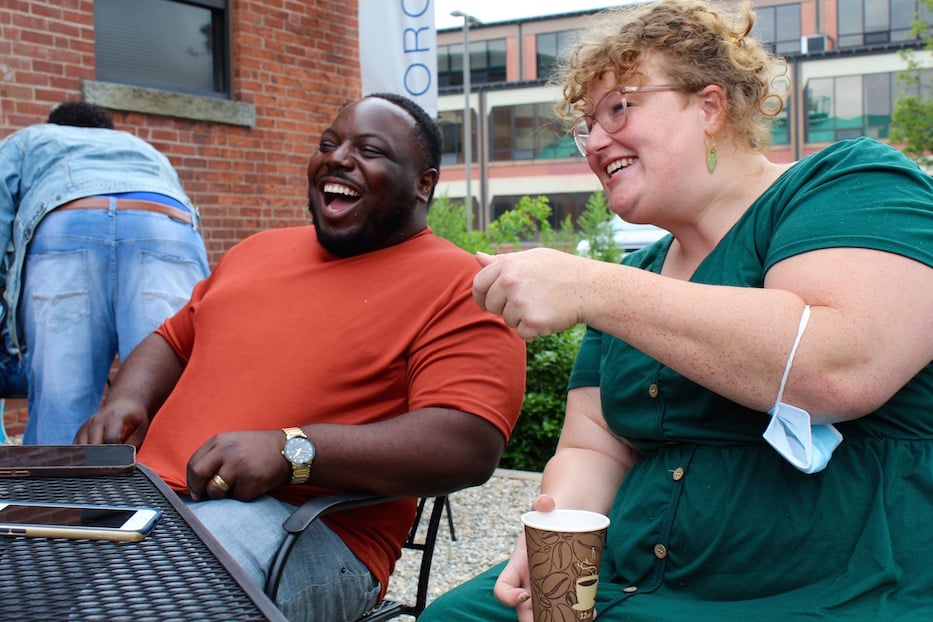 Hudson and Nearing.
Hudson and Nearing.
She listened carefully to the double bass as Trent gave the Gershwin a full-bellied beginning, like a rumble strip set beneath a bolt of silk. She went over Gershwin’s first verse, her voice soft and muscled at the edges. Bolden came in, and her hands became part of the band, fist against open palm. When he stepped away, Adams’ eyes gleamed.
Her voice had become deep enough to hold a year ravaged by two pandemics. She raised her arms and squared her shoulders as the verse hit. Fluker listened carefully for where her vocals would end and the horn would begin.
Summm-mm-er-timmmme! She belted. And the living, it ain’t easy! No no no! Police brutality is at an all time high! My hands up! I’m down/On the ground! Get your knees out my neck! I can’t breathe! How many more of my sons and daughters have to die?
“Come on, come on!” someone yelled from the audience. Each lyric carried years of memory: of Malik Jones’ murder and his mother Emma’s fight for justice, of protests that filled the streets five years ago and then again last summer; of a movement that has blocked the highway and Whalley and Union Avenues all in the last year. When Adams finished, the audience exploded into applause.
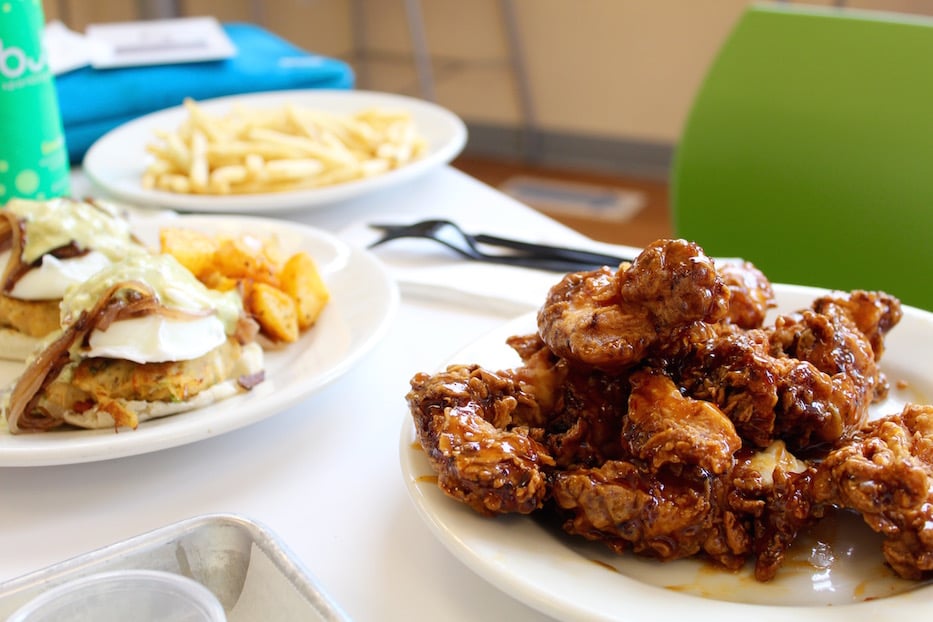
Crab cakes benedict (at left) and chicken tenders.
Since their birth last year, jazz brunches at ConnCAT have been like the food they turn out—sleek and soulful but never fussy, with a focus on passing the knowledge from one lifelong student to another. Hudson, a singer, songwriter, musician, mentor and organizer in the city’s music community, joked with Bolden that he had come “with 20,000 questions,” but would halve the number in the interest of time.
He recalled entering the cafe just hours before, and heading over to Bolden with the intention of saying hello. Bolden was listening to and then mirroring a sax solo. Hudson just watched in awe. Born and raised in New Haven, he has spent the last 10 or 11 years learning from masters, from the George Baker Band at Cafe Nine to late nights with Rohn Lawrence at Toad’s Place.
“I thought to myself, man,” Hudson said. “How brilliant and significant that this man, who clearly is a master of the craft, is studying right here and now.”
Bolden, who was born in South Carolina but grew up in New Haven, said that he sees it as part of his work as a perpetual student of the craft. Long before he was legally allowed to play at the Monterey, he would sneak into the club with crowds that came to see jazz legends.
Bolden remembered looking in through the club’s large window, watching the musicians until enough people arrived and it was possible to slip inside undetected. He didn’t just frequent the Monterey, but many of the clubs in the area, hopping from New Haven to Bridgeport to listen to the musicians who became his teachers.
“I just loved the sound of the music,” he said. “Not knowing intricately what it was actually listening to … just that it had a beat and a rhythm to it, and I just liked it. There was a bunch of us kids who used to stand outside the Monterey, peeking in through the window.”
As a student, he said he was inspired by musicians around him. Through the city’s jazz scene, he saw the Marlin Jazz Quartet, Horace Silver, Sunny Stipp and Gene Ammons, and played with Dexter Gordon. He celebrated the Buster Brothers, a mainstay of the city’s scene with whom he later played.
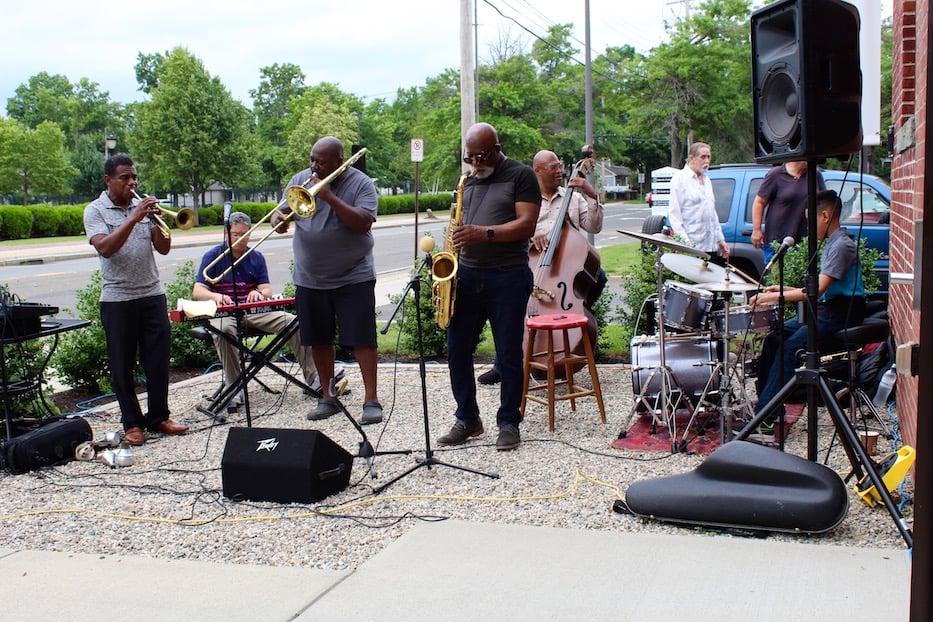
Trombone player Keith Middleton joined the band later in its set.
He hasn't stopped since. At 83, he returned to the Hartt School of Music to finish a degree that he started in 1958, and then put on the back burner to go on tour. He doesn’t consider himself bound to a genre—he isn’t a jazz musician, or a blues musician, or a rock and roll musician. He’s just a musician.
“It’s all music to me,” he said to applause and laughter from attendees.
“I’m learning stuff that I didn’t know before,” he added. “I’ve never stopped playing. I’ve only slowed down because there wasn’t a venue to play in.”
To stay fresh, he said, he listens to gospel—a response that drew squeals of delight and calls of “That’s right!” from the crowd. Hudson beamed, noting that he didn’t want the afternoon to go by without the two of them doing a song together.
“What’s your wish for young folks here?” he asked. “What do you want to encourage the current, active young musicians on the scene now, what do you encourage them to do?”
In the crowd, young musicians Edwards and Godley sat up a little straighter. Both later played and sang with the band, before turning the mic over to a mix of improvisers, actors and fellow young musicians.
“Music has no limits on what you can count on,” Bolden said. “No limits on what you can play. That’s music in general. You may have a liking to one style of music in general, but learn music in general. And your likeness will take you to what you really want to concentrate on. If you really want to be a good musician, learn all the genres of music.”
“That’s for me,” Hudson said. “Thank you for that. Thanks for bearing witness, y’all.”

